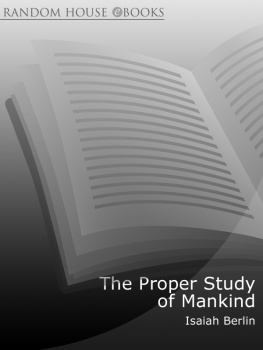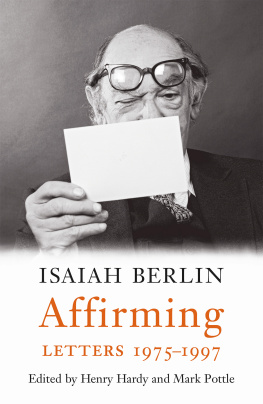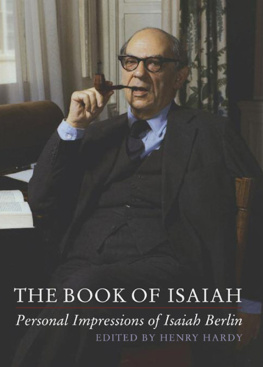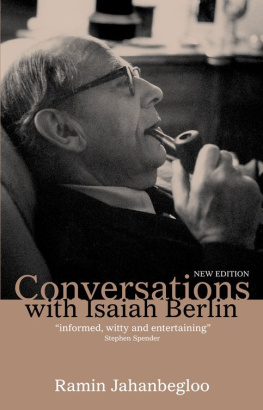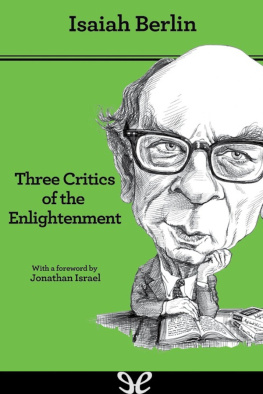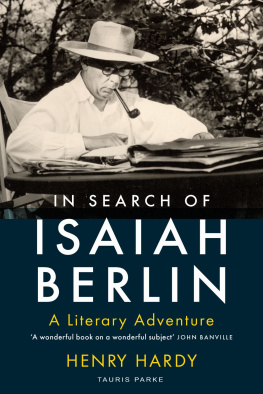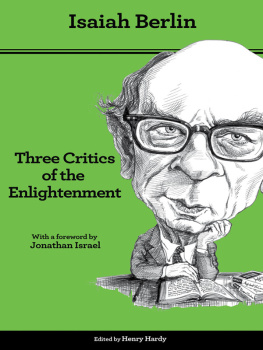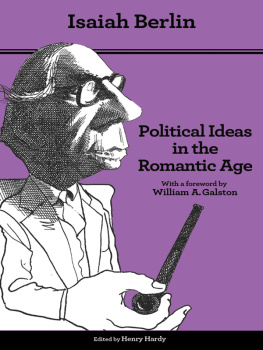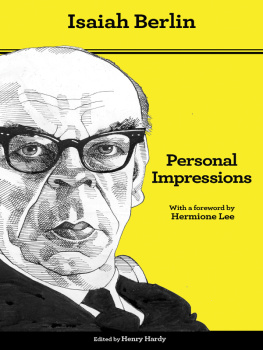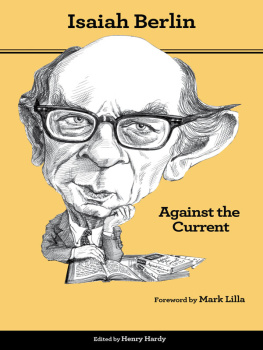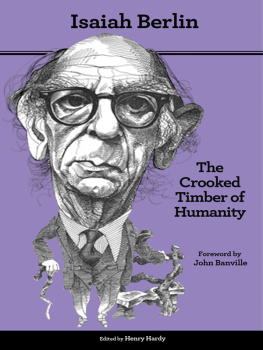CONTENTS
About the Book
Isaiah Berlin was one of the leading thinkers of the century, and one of the finest writers. The Proper Study of Mankind provides a selection of the best of his essays. The full (and enormous) range of his work is represented here, from the exposition of his most distinctive doctrine pluralism to studies of Machiavelli, Tolstoy, Churchill and Roosevelt. In these pages he encapsulates the principal movements that characterise the modern age: romanticism, historicism, Fascism, relativism, irrationalism and nationalism. His ideas are always tied to the people who conceived them, so that abstractions are brought alive. His insights illuminate the past and offer a key to the burning issues of today.
About the Author
Sir Isaiah Berlin, O. M., was born in Riga, Latvia, in 1909. He came to England in 1919 and was educated at St Pauls School and Corpus Christi College, Oxford. At Oxford, he was a Fellow of New College (193850), Chichele Professor of Social and Political Theory (195767), first President of Wolfson College (196675), a Fellow of All Souls College, and President of the British Academy from 19741978. His achievements as an historian and exponent of ideas earned him the Erasmus, Lippincott, and Agnelli Prizes, and his lifelong defence of civil liberties earned him the Jerusalem Prize. He died in 1997.
Also by Isaiah Berlin
KARL MARX
THE AGE OF ENLIGHTENMENT
FOUR ESSAYS ON LIBERTY
VICO AND HERDER
Edited by Henry Hardy and Aileen Kelly
RUSSIAN THINKERS
Edited by Henry Hardy
CONCEPTS AND CATEGORIES
AGAINST THE CURRENT
PERSONAL IMPRESSIONS
THE CROOKED TIMBER OF HUMANITY
THE MAGUS OF THE NORTH
THE SENSE OF REALITY
For Aline
FOREWORD
Noel Annan
Isaiah Berlin began his academic career as a philosopher at Oxford and became famous as a historian of ideas. Oxford philosophy is important to him. It rooted him in the English linguistic analytical tradition that descends from Hume, Mill and Russell. That is why when he wrote his account of the two concepts of liberty he was so wary of what is often called positive freedom. When he wrote (in 1958) it was fashionable to expose the fallacies in Mills On Liberty and praise the conception of freedom that T. H. Green, influenced by Hegel and other Continental philosophers, had popularised. Green had argued that when the State interfered and passed laws forbidding pollution or controlling factory machinery, in order to safeguard workers lives, the State was not curtailing freedom. Yes, a few men might consider that their freedom had been curtailed, but vastly more people would now be free to do things that hitherto they had been unable to do. The sum of freedom would be increased. Freedom for an Oxford don, it was said, is a very different thing from freedom for an Egyptian peasant. To accept positive freedom became the hallmark of the intelligent social democrat.
Berlin denounced this proposition as claptrap. If positive freedom is a valid ideal, then what defence is there against the Marxist claim that the State has the right to inflict terrible punishments upon those who oppose its power to compel individuals to act against what they want to do, on the grounds that they should be contributing to the welfare of the mass of the population? For Berlin the classic English interpretation of liberty is correct. It means not being coerced, not being imprisoned or terrorised. Yes, the Egyptian peasant needs food and medicine, but the minimum It may well be necessary to sacrifice freedom to prevent misery. But it is a sacrifice; and to declare that I am really more free is a perversion of words. It may be that society is more just or prosperous and all sorts of poor people are now able to enjoy holidays abroad or have a decent home. They were free before to enjoy these things but they did not have the money. It is a perversion of language to say that now for the first time they are free.
Perversion of language is not a philosophers fad. It matters. It matters if we say we are more free when new laws are passed to compel us to wear seat-belts in cars. We may be safer and the law may be admirable, but we are less free. Suppose we follow Rousseau and argue that no one in his right mind would wish to be a slave of ignoble passions. Suppose I am an alcoholic, a slave to the bottle. Would I not welcome being freed from that slavery? Surely my enlightened self would wish to renounce that part of my liberty that enslaves me to the bottle. Few of us are saints. Saints declare, In thy service is perfect freedom, renounce worldly vices, and live according to a spiritual rule. But what are we to do with the majority of mankind who are unable to master their sinful passions? Here, says Berlin, the real horror of a purely rational view of life unfolds. For if it can be shown that there is only one correct view of life, people who fail to follow it must be forced to do so. Positive freedom is the road to serfdom.
But there is yet another way of denying that human beings are free agents. Are they not the playthings of fate, caught inescapably by the impersonal forces of history? Historical processes are inevitable and, although statesmen pretend that they have the power to control events, human beings are powerless to do so. Climate, demography, the vagaries of the economy, class structures and political forces overwhelm them. It is the mission of the historian, so this line of reasoning continues, to unmask these impersonal forces. History is not an art, it is a science, no more, no less as the Cambridge historian J. B. Bury said. One of Berlins longest and most dense articles is deployed against this contention, and in his joust against E. H. Carr, the apologist for Stalins regime, he was judged to have unhorsed his opponent. To believe in determinism would entail a shattering loss in the concepts with which we discuss morality praise, blame, regret, forgiveness for instance.
Rooted though Berlin was in the English tradition of philosophy he rejected much that was fashionable among his contemporaries. He thought logical positivism no less disastrous than determinism. The natural sciences were not the paradigm of knowledge. Too much of what we know and value in life is excluded by this way of categorising thought. For what is remarkable about the body of his work is that it recognises how valuable, how challenging, how original were the contributions of the German philosophers in the eighteenth and nineteenth centuries. These were the men who were revolting against the soulless, mechanical ideas of the French Enlightenment. Berlin begged his contemporaries to stop regarding them and their analogues in Russia or Italy Vico, Herder, Hamann, Herzen and Moses Hess as benighted romantics.
He has praised them for recognising the passion men and women feel for their homeland, their own specific culture, for their nation or for their community say, a mining village. These were what gave them their sense of identity. Marx ignored this. Berlin knows how Jews in Eastern Europe felt alienated from the society in which they lived; and from this understanding he perceives how Germans in the nineteenth century felt alienated from a Europe dominated by French culture and sophistication just as in our times Third World countries are alienated by the Western sense of superiority.
Berlin therefore disagreed with the most powerful voices in philosophy because he did something not all that common among philosophers immediately before and after the War. He read the works of philosophers long dead, indeed of some who would not in Oxford have been called philosophers. He did not convict them of error and contrast them with the truth as we know it today. Nor did he divide them into those who point the way to saner times and those whom tyrants have used to justify their cruelty. What he did was to evoke their vision of life and contrast it with other visions of life. That is not all. He denies that there is any way of proving that one vision is more valid or more justifiable than any other. One might find Joseph de Maistres analysis of society hateful, but we would be wrong not to realise that it contains some terrible truths, however liberals might shudder at the conclusions Maistre drew from them. Consider Nietzsche. In his works are conclusions which the Nazis tried to translate into political action. But we would be amputating part of our sensibility if we failed to receive Nietzsches astonishing understanding of a world no longer willing to accept the sanctions of religion as valid. Or consider Carlyle. Set beside his contemporaries, Marx and Tolstoy, he cuts a very poor figure. But he was nearer the truth than Marx and Tolstoy in reminding us that nations and societies need leaders. We do not have to agree with Carlyle when he praises Frederick the Great and Cromwell for the harshness and inhumanity of their decisions. Marx and Tolstoy were wrong to declare that statesmen are so insignificant that they do not influence events. Churchill, Roosevelt and Ben-Gurion had a crucial influence upon the destiny of their countries.

